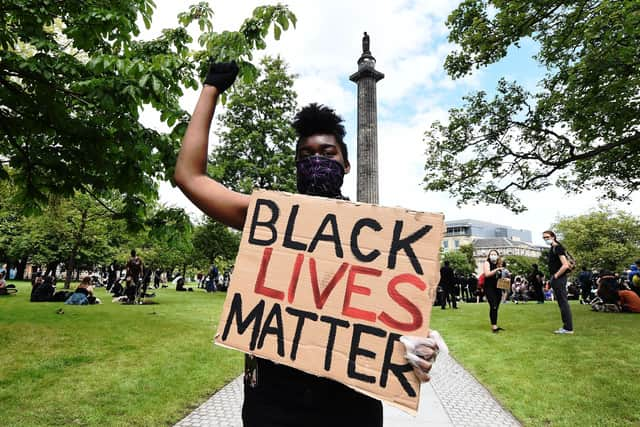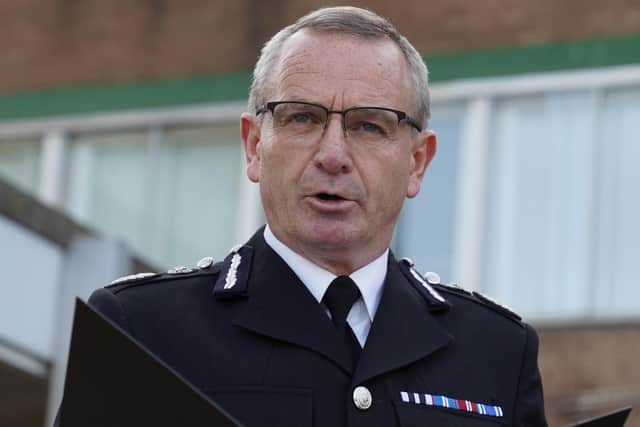What is institutional racism and what has Police Scotland done?
Addressing a meeting of the Scottish Police Authority (SPA) on Thursday, May 25, Sir Iain Livingstone said acknowledging the issue exists is “essential” to a commitment to champion equality and become “an anti-racist service”.
What is the definition of institutional racism?
Following the murder of Stephen Lawrence in 1993, a public inquiry was ordered by the then home secretary Jack Straw. The inquiry was carried out by Sir William Macpherson and considered the police response to Stephen’s death as well as systemic racism.
Advertisement
Hide AdAdvertisement
Hide AdSir William Macpherson defined institutional racism as: "The collective failure of an organisation to provide an appropriate and professional service to people because of their colour, culture, or ethnic origin. It can be seen or detected in processes, attitudes and behaviour that amount to discrimination through prejudice, ignorance, thoughtlessness, and racist stereotyping which disadvantage minority ethnic people.”
A. Sivanandan, a former Director of the Institute of Race Relations, used this definition: “Institutional racism is that which, covertly or overtly, resides in the policies, procedures, operations and culture of public or private institutions - reinforcing individual prejudices and being reinforced by them in turn."


What is institutional racism?
Institutional racism, sometimes described as systemic racism, is an umbrella term for structures, policies and practices in an organisation such as the police – or even in society as a whole – that cause and perpetuate unfair treatment of people based on race.
It is a phenomenon which emerges in the criminal justice system as well as health care and education and throughout society.
The term was first used by US civil rights activists Stokely Carmichael and Charles V. Hamilton in the 1960s to refer to the ‘less overt, far more subtle’ kind of discrimination affecting black people in America alongside individual instances of racism abuse and prejudice.


Examples include racial profiling by law enforcement, under- and misrepresentation of ethnic minorities in media as well as barriers to employment or professional development based on race.
The Macpherson Report concluded that the Metropolitan Police Service, which investigated the killing of Stephen Lawrence, was institutionally racist.
In his report, Sir William made 70 recommendations for reform including abolishing double jeopardy, making racist statements made in private a criminal act, as well as urging other public bodies such as councils and the NHS address issues of systemic racism.
Advertisement
Hide AdAdvertisement
Hide AdExamples from the field of healthcare include the fact black women are four times more likely to die in pregnancy, labour and after birth than white women.
ONS data shows black men were 4.2 times more likely, and black women 4.3 times more likely, to die from coronavirus than their white counterparts during the early period of the pandemic.
The Commission for Racial Equality states: “If racist consequences accrue to institutional laws, customs or practices, that institution is racist whether or not the individuals maintaining those practices have racial intentions.”
What did Sir Iain Livingstone say about Police Scotland?
He stressed the admission “absolutely does not mean” all officers and staff are racist, sexist or homophobic, and he praised the “incredible” work they do each day to keep people and communities safe.
Sir Iain went on to warn there is “no place” in Police Scotland for people who do harbour prejudices, and that the behaviour of colleagues who have been found to hold such views is “utterly condemned”.
Sir Iain said: “It is right for me, the right thing for me to do as chief constable, to clearly state that institutional racism, sexism, misogyny and discrimination exist.
“Police Scotland is institutionally racist and discriminatory.
“Publicly acknowledging these institutional issues exist is essential to our absolute commitment to championing equality and becoming an anti-racist service. It is also critical to our determination to lead wider change in society.
Advertisement
Hide AdAdvertisement
Hide Ad“Prejudice and bad behaviour within policing, as highlighted by court and conduct cases, various independent reviews and by listening to our own officers and staff over recent years, is rightly of great concern and is utterly condemned.
“There is no place in Police Scotland for those who reject our values and standards.”
Why has institutional racism been raised now?
The admission comes days after it was announced that thousands more Police Scotland officers would be enlisted to stamp out offensive “banter” and so-called “canteen culture” as part of a mandatory programme entitled Policing Together.
This in turn came as a report was published which found “instances of ongoing discrimination against minoritised communities, including first-hand accounts of racism, sexism and homophobia” by serving officers.
Scotsman Investigations Correspondent Martyn McLaughlin said: “For years, such damning assessments have been levelled at the force by some inside it, as well as others outside it. That the same conclusion has now been reached by Sir Iain Livingstone, its outgoing chief constable, is a game changer. Or, at least, it should be.
“Sir Iain stressed bringing such issues out into the open was crucial to expedite real change and realise the goal of an “anti-racist service”. He also pointed out his admission of institutional discrimination did not mean that individual officers or staff were racist or sexist.”
